2017 浙江省金华市中考英语真题及答案
卷 Ⅰ
说明:本卷共有三大题,45 小题,满分 70 分。[来源:中#国&*教育出@版网~]
一、听力(共 15 小题,满分 25 分)
第一部分 听力部分
第一节,听小对话,从 A、B、C 三个选项中选出正确的选项,回答问题。(共 5 小题,每
小题 1 分,满分 5 分)
1. Where did Bob go on holiday?
A. Beijing.
B. London.
C. Sydney.
2. What’s wrong with Ben?
A. He’s got a toothache.
B. He’s hurt his leg.
C. He’s caught a cold.
3. How much are Jimmy’s sunglasses?[w~ww.zzs%tep*&.co@m]
A. 25 pounds.
B. 35 pounds.
C. 45 pounds.
4. Who will be the new English?
A. Mr. Smith.
B. Mr. Brown.
C. Mr. Green.
5. What is the probable relationship between the two speakers?
A. Mother and son.
B. Doctor and patient.
C. Waiter and customer.
第二节:听长对话,从 A、B、C 三个选项中选出正确的选项,回答问题。(共 5 小题;每
小题 2 分,满分 10 分)
听下面一段较长对话,回答 6、7 小题。[来源:中^%国教育~出版网#&]
6. Where does the conversation probably take place?
A. At the restaurant.
B. On the bus.
C. In the street.
7. Why does Tom work in the bookshop?
A. Because he wants to help his family.
B. Because he needs money for a bike.
C. Because he wants to read more books.
听下面一段较长对话,回答 8-10 三个问题。[www.#z&zst^e~p.c@om]
8. What is Mike working on?
A. A story.
B. A letter.
C. A speech.
9. How did Mike feel when he heard the news?
A. Surprised.
B. Bored.
C. Worried.
10. When will Mary go for the trip?
A. Next Friday.
B. Next Saturday.
D. Next Sunday.
�
第三节:听下面一段独白,从 A、B、C 三个选项中选出正确的选项,完成信息记录表。(共
5 小题;每小题 2 分,满分 10 分)
An Interview with David
Topic
Reason
Subjects
Methods
11
education
No
12
schools
Maths, English and
13
Use books or Internet
14
Activities
Go to the sports club every weekend
Go to the dance club
15
a month
11. A. radio
B. Internet
C. home[来源:@%中&#教~网]
12. A. Chinese-speaking
B. French-speaking
C. English-speaking
13. A. history
B. art
C. geography
14. A. taught by parents
B. discuss with friends
C. do experiments in the
lab[来源:中%@国#教育出~版网&]
15. A. once
B. twice
C. three times
第二部分 笔试部分
二、完形填空(共 15 小题;每小题 1 分,满分 15 分)
阅读下面短文,掌握其大意,然后从每题所给的 A、B、C、D 四个选项中选出最佳选项。[来
#源:中国&*教^育出~版网]
I was standing in line behind a woman in her 60s. When it was her turn to pay,
the shop owner greeted
16
and asked how she was doing.[中国教育出%版网^@*&]
The woman looked down, shook her head and said, “Not so
17
, my husband
just lost his job. I don’t know how I can
18
the holidays.”
Then she gave the shop owner the food stamps(食品券)for poor families.[来
#源:中教%*&网~]
My
19
hurt, I wanted to help but didn’t know
20
. Should I offer to
pay for her food, or ask for her husband’s resume(简历)?
21
I walked towards my car, I met the woman again. I remembered something
in my wallet. It wasn’t any money or an offer of a job, but
22
it would
help.[www.zz^s%~@tep#.com]
“Excuse me,” I said, “I heard what you said to the shop owner. It sounds
like you’re going through a really
23
time right now. I’m so sorry. I’d like
to give you something.” [中^%&国#教育@出版网]
�
I
24
her the small card from my wallet.
When the woman read the two
25
on the card, she began to cry. Through her
tears, she said, “You have no idea how much this
26
to me.”
To tell the truth, her reply was a little
27
, Having never done anything
like this before, I didn’t know what could happen. All I could say was, “Would
it be OK to give you a hug?”
After that, I walked into my car and began to
28
too.
The words on the card?
“You Matter.”
A few weeks earlier, a friend gave me a similar
29
as encouragement for
my work. When I read it, I
really felt
30
. So I ordered my own box of You Matter
cards and started sharing them.
16. A. him
B. her
C. me
D. us
17. A. bad
B. busy
C. funny
D. good
18. A. get through
B. give up
C. put off
D. talk about
19. A. hand
B. head
C. heart
D. leg
20. A. how
B. when
C. where
D. why
21. A. After
B. Although
C. As
D. Once
22. A. again
B. instead
C. maybe
D. often
23. A. dull
B. hard
C. pleasant
D. special
24. A. handed
B. lent
C. read
D. sold[中~国&^教育出%
版网@]
25. A. expressions
B. letters.
C. sentences
D. words
26. A. explains
B. introduces
C. means
D. suggests
27. A. boring
B. exciting
C. relaxing
D. surprising
28. A. chat
B. cry
C. drive
D. shake[来@源:中*&~
B. resume
C. stamp
D. wallet
B. sorry
C. well
D. warm
国%教育出版网]
29.
A. card
30. A. silly
【答案】
16.B
17.D
18.A
�
19.C
20.A [来源:#*~zzste@p.^com]
21.C
22.C
23.B
24.A [w%~w@w.zzstep*.^com]
25.D [来^#源:@中教&%网]
26.C
27.D [来%源:@中^国教~育出版#网]
28.B [来源~:中%@教#网&]
29.A
30.D
【解析】
试题分析:这篇短文主要介绍了作者在收到朋友鼓励的卡片后感到非常温暖,于是自己定
制类似的卡片开始与人分享,帮助其他有困难的人。
16.B 考查代词及语境的理解。A. him 他; B. her 她; C. me 我; D. us 我们。当轮到
她付款时,店主和她打招呼询问她过的怎么样。 根据上文提到的是位女士,故选 B。[中#
国~教育@*出%版网]
17.D 考查形容词及语境的理解。A. bad 糟糕的,坏的; B. busy 繁忙的; C. funny 有
趣的; D. good 好的。根据后文 my husband just lost his job 可知她过的不是很好,故
选 D。
18.A 考查动词短语及语境的理解。A. get through 熬过,度过;B. give up 放弃; C. put
off 推迟; D. talk about 谈论;根据上文丈夫失去了工作,可知那个女人说不知道怎么
熬过这个假期。故选 A。
19.C 考查名词及语境的理解。A. hand 手; B. head 头; C. heart 心;D. leg 腿。根
据上文女士的描述及后文作者想帮助她,可知作者心疼。故选 C。
20.A 考查动词及语境的理解。20. A. how 怎样; B. when 何时; C. where 哪里; D.
why 为什么。根据后文作者的疑惑‘Should I offer to pay for her food, or ask for her
husband’s resume(简历)?’,可知作者不知道怎样帮助她,故选 A。
�
24.A 考查动词及语境的理解。A. handed 递给; B. lent 借给; C. read 读; D. sold
卖。我把我钱包里的那张小卡片递给她。结合句意,故选 A。
25.D 考查名词及语境的理解。A. expressions 表达;B. letters.信; C. sentences 句
子; D. words 字。根据后文 The words on the card?“You Matter.”可知是两个字,故
选 D。
26.C 考查动词及语境的理解。A. explains 解释; B. introduces 介绍; C. means 意
思,意味; D. suggests 建议。你不知道这对我的意义是多少。结合句意,故选 C。
27.D 考查形容词及语境的理解。A. boring 无聊的; B. exciting 兴奋的; C. relaxing
放松的; D. surprising 吃惊的。根据后文作者以前从来没有这么做过,不知道会发生什
么,可知句意“说实在的,她的答复有点儿令人吃惊。”故选 D。
28.B 考查动词及语境的理解。A. chat 聊天; B. cry 哭; C. drive 驾驶; D. shake
晃动;之后,我进入我的汽车也开始哭。根据上文 Through her tears…,及 too,故选 B。
29.A 考查名词及语境的理解。A. card 卡片; B. resume 简历; C. stamp 邮票; D.
wallet 钱包。几周前,我的朋友给了我一个相似的卡片作为对我工作的鼓励。结合上下文,
故选 A。
考点:情感故事类短文。
三、阅读理解(共 15 小题;每小题 2 分,满分 30 分)[ww^w.&zz*step.com%#]
阅读下面四篇短文,从每题所给的 A、B、C、D 四个选项中选出最佳选项。
�
31.
How many lessons are there in Unit 1?[来源:中教^~%网#@]
A. Two
B. Three
C. Four
D. Five
32. If you want to learn how to write a poem, you can get help in _______.
A. Lesson 1
B. Lesson 2
C. Lesson 3
D. Lesson 4
33. Where can we most probably read such a page?
A. In a magazine.
B. In a textbook.
C. In a newspaper.
D. In a dictionary.
【答案】[w%ww.z^zste*&p.com~]
31.C
32.C
33.B
【解析】[来源:zz%s&tep~#.c@om]
�
试题分析:这篇短文主要展示了教科书 unit 1 的目录页图片。
考点:图片类短文阅读。
B[中国教育出版~*网%@#]
World’s history in one place
Is it possible to put millions of years of t he world’s history into one building?
The British Museum seems to think so. "[来源:%zzste*p.com~@&]
A history of the World in 100 Objects", an exhibition about rare and ancient
objects from the world, has made it a success.
The British Museum says it owns at least 8 million historical objects. But why
choose these 100 objects to tel stories of our world's history?[来源:&中@国教育
出^%版*网]
It all started with a challenge(挑战).[中国#教~&@育%出版网]
Neil MacGregor, who was once director of the British Museum, was asked by BBC
to choose 100 objects from the museum's huge collection. The objects had to include
things from the beginning of human history about 2 million years ago to the present
day.
MacGregor accepted, and took four years to choose each object himself.
In 2010, MacGregor appeared on BBC radio, giving a detailed(详细的)explanation
of each object. The show was a big hit and all these 100 objects were shown in the
British Museum. A book with photos of each object soon followed.
"The objects had to cover the whole world, from a cooking pot to a golden galleon,
from a Stone Age tool to a credit card." MacGregor wrote.
The collection includes many important objects from China. There is a banknote
from the Ming Dynasty, showing China as the first country to use paper money.
But it’s not just ancient things that are shown. Among them are some modern
things like a solar-powered lamp and even a throne made of weapons created by an
African artist.
“Of course, the collection could only be ‘a’ history of the world. But it
is still a history that people in the present world need to know.” MacGregor wrote.
�
34. “A history of the World in 100 Objects” is a(n) ________.[中~国%教育出@
版#&网]
A. TV programme about Africa
B. challenge of scientific research
C. book about modern development
D. exhibition of the world’s history[中~
国&^教育出%版网@]
35.
We can learn that the BBC programme by Neil MacGregor was _______.
A. successful
B. expensive
C. regular
D. traditional
36. Which of the following is TRUE according to the passage?
A. The objects shown cover half of the world.
B. Neil MacGregor used to be
director of BBC.
C. China was the first country to use paper money.
D. The British Museum owns
2 million historical objects.
【答案】
34.D
35.A
36.C
【解析】
试题分析:这篇短文主要介绍了大英博物馆“100 件文物中的世界历史”展览取得了巨大成
功。
34.D 细节理解题。根据第二段 A history of the World in 100 Objects", an exhibition
about rare and ancient objects from the world, has made it a success.可知 A history
of the World in 100 Objects 是 an exhibition 一个展览,故选 D。
考点:新闻报道类短文阅读。
C[ww~w.zzs%#t@ep.^com]
Almost all animals need to sleep to stay healthy. But sleeping can also be
dangerous because other animals may hurt those who are sleeping. This leads to many
different ways of sleeping that help them stay safe. Some of these ways may surprise
you!
Almost all bats sleep upside down. They hang from a branch of a tree or the
�
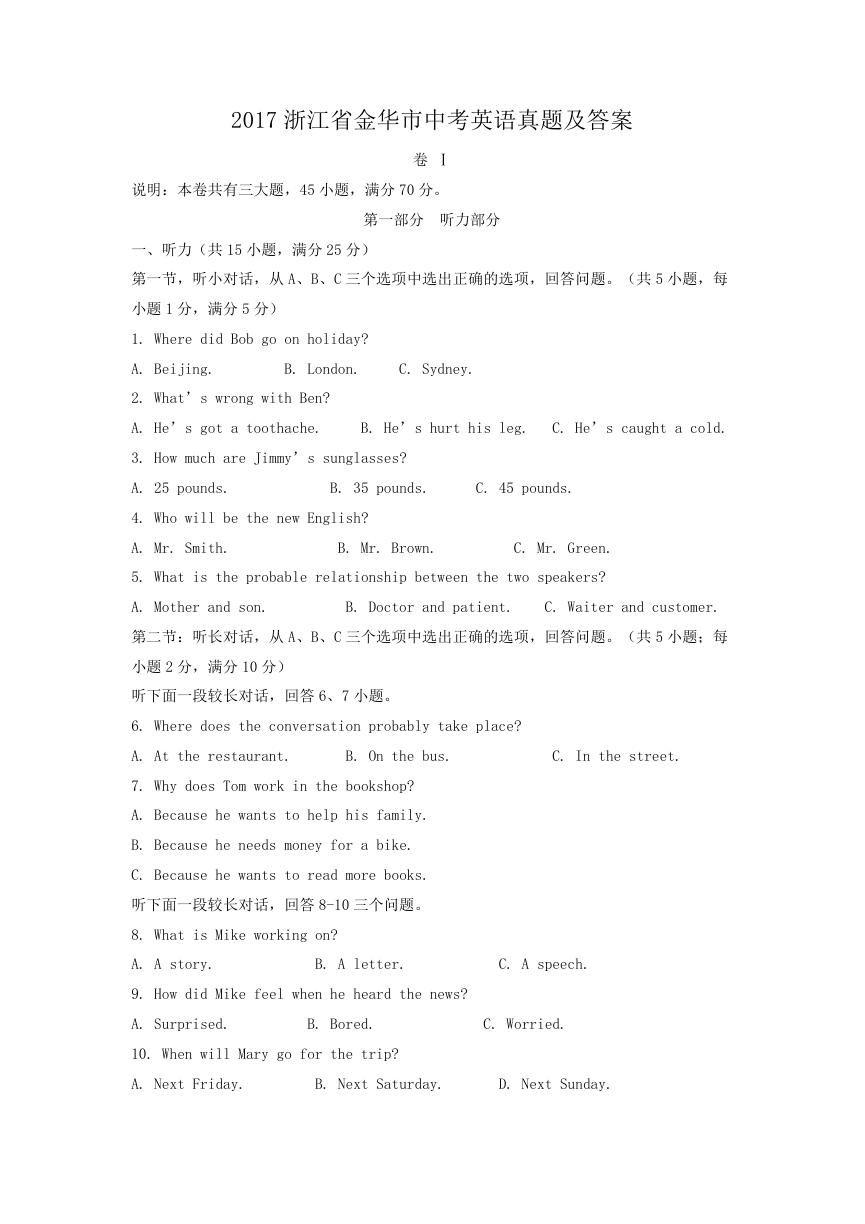
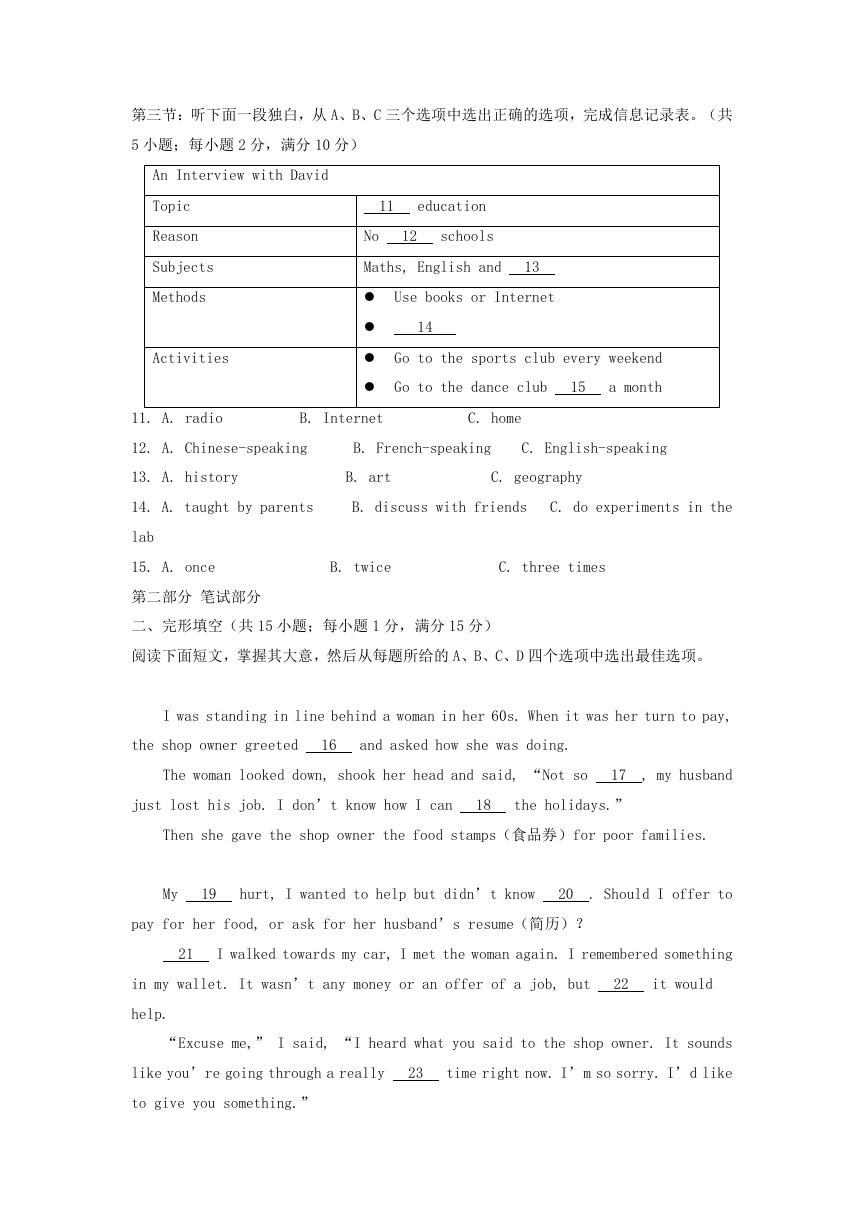
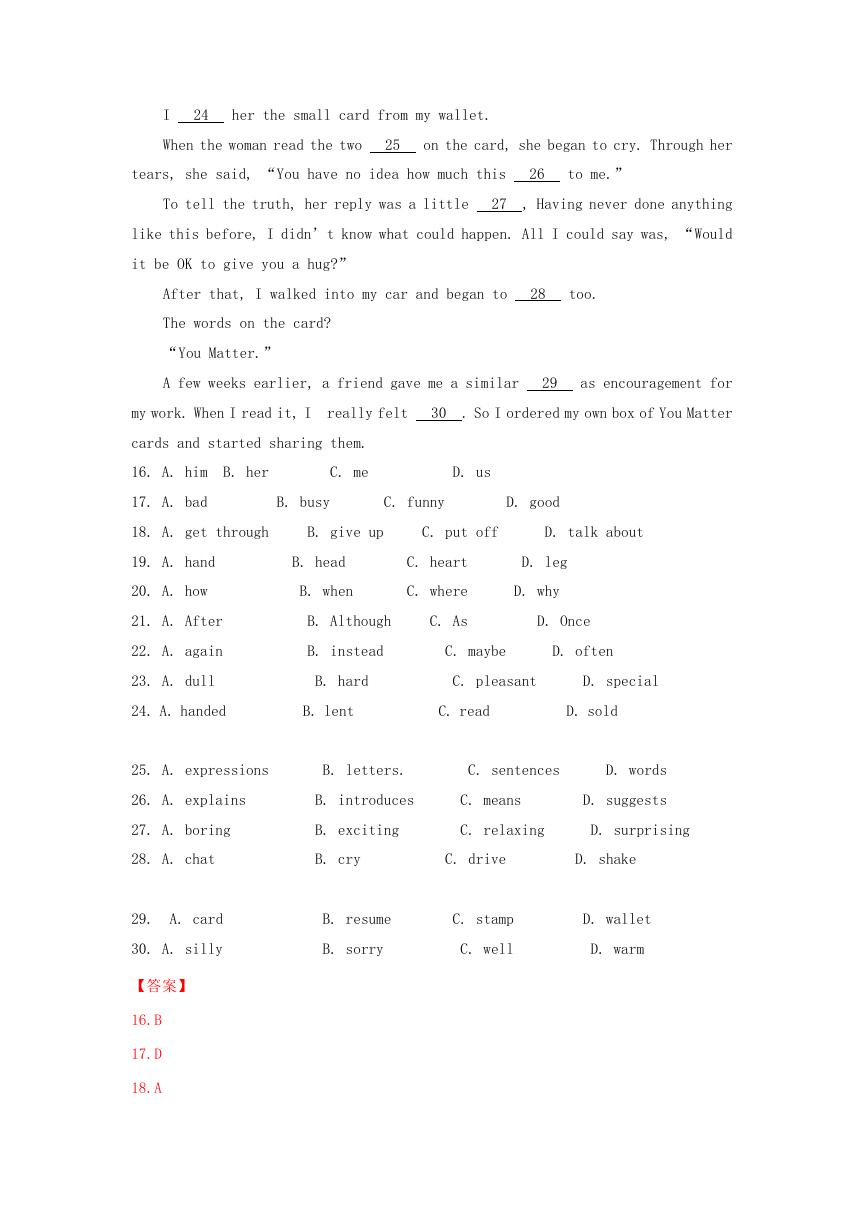
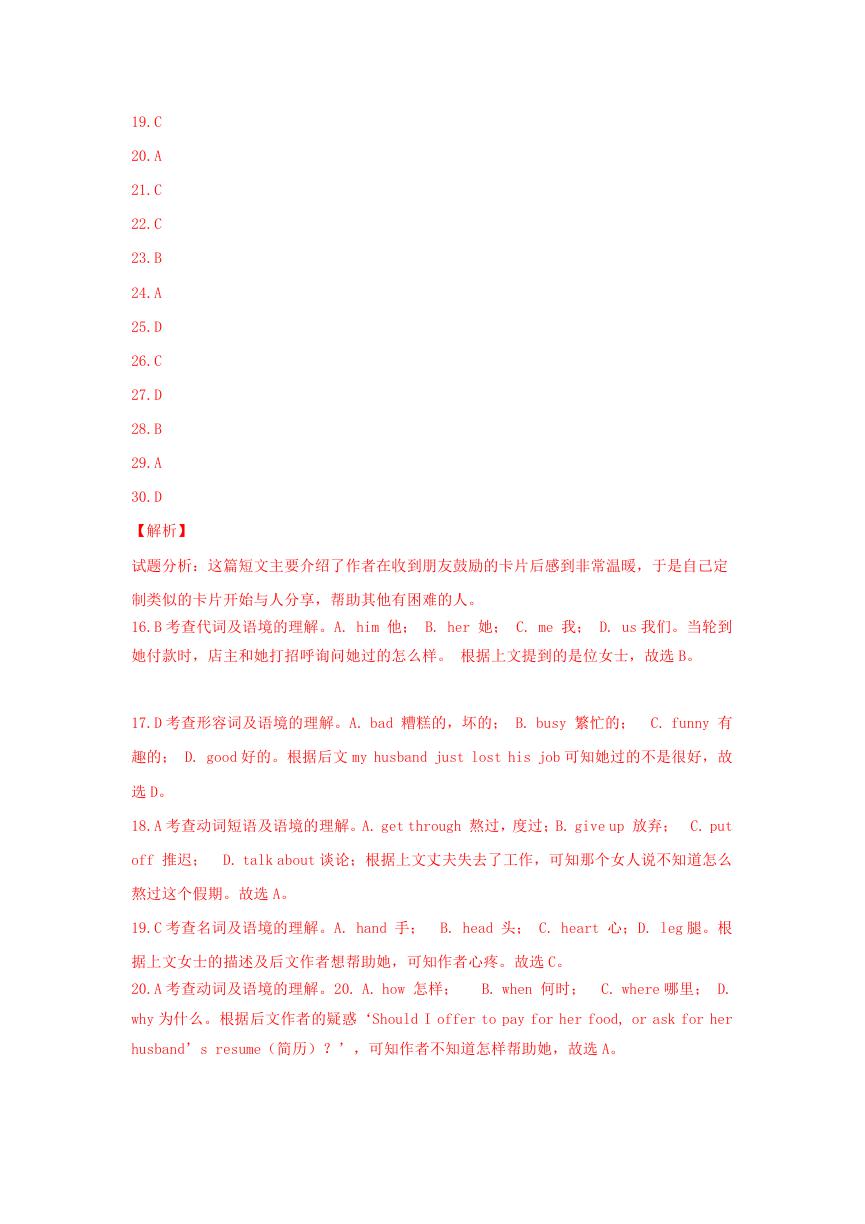
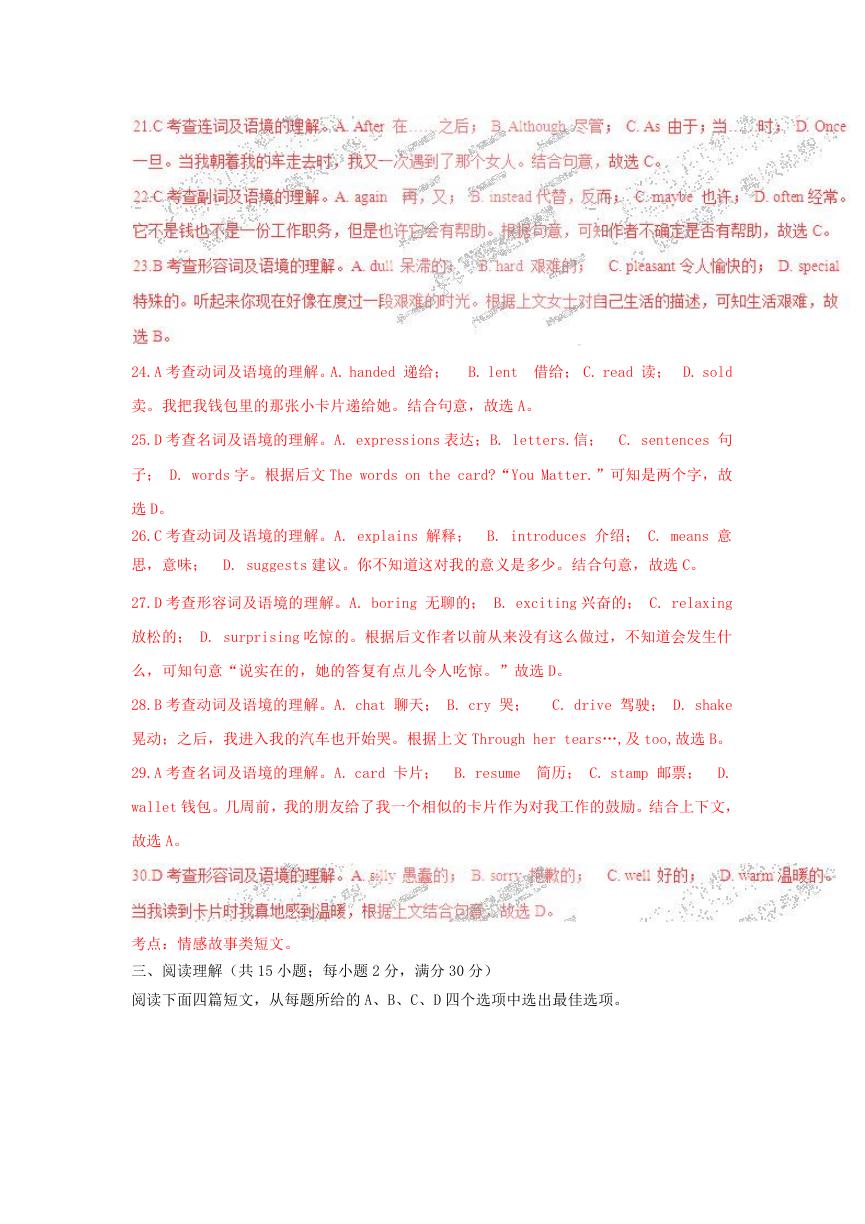
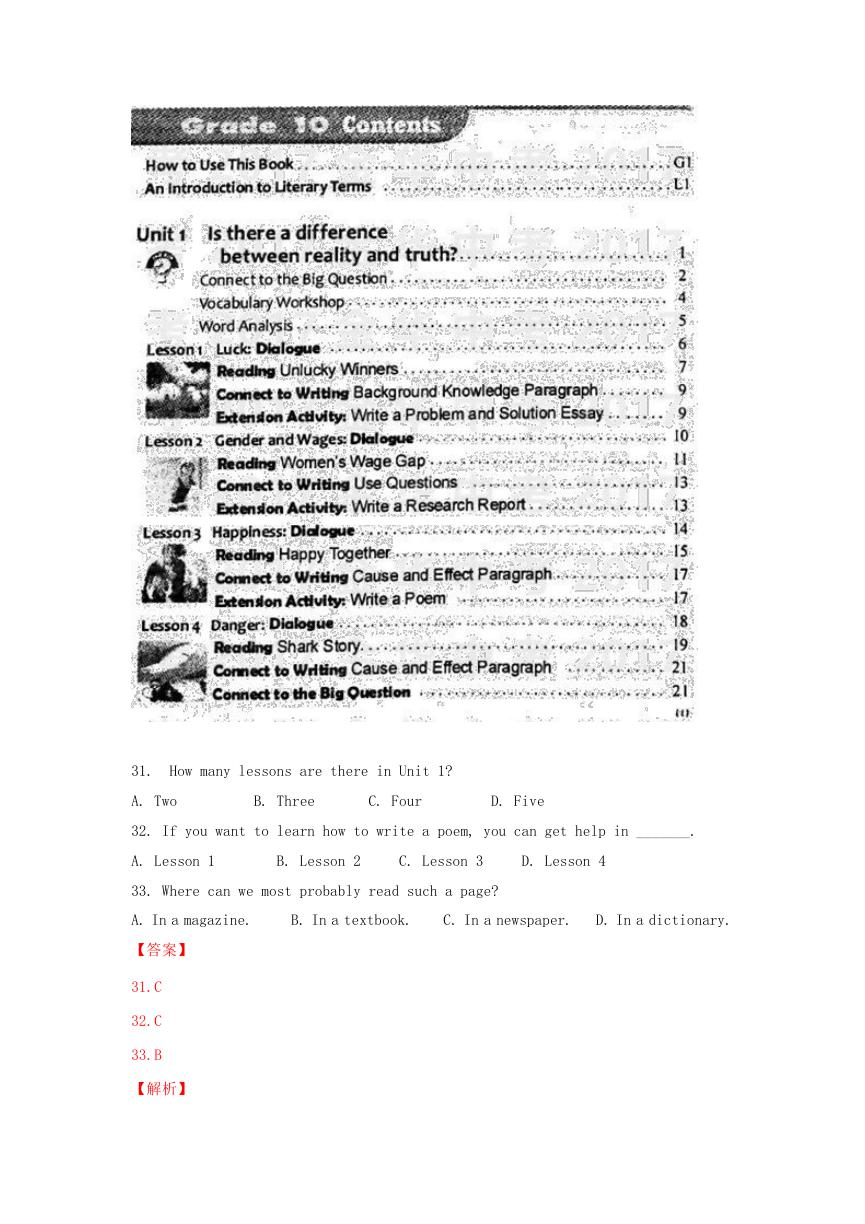

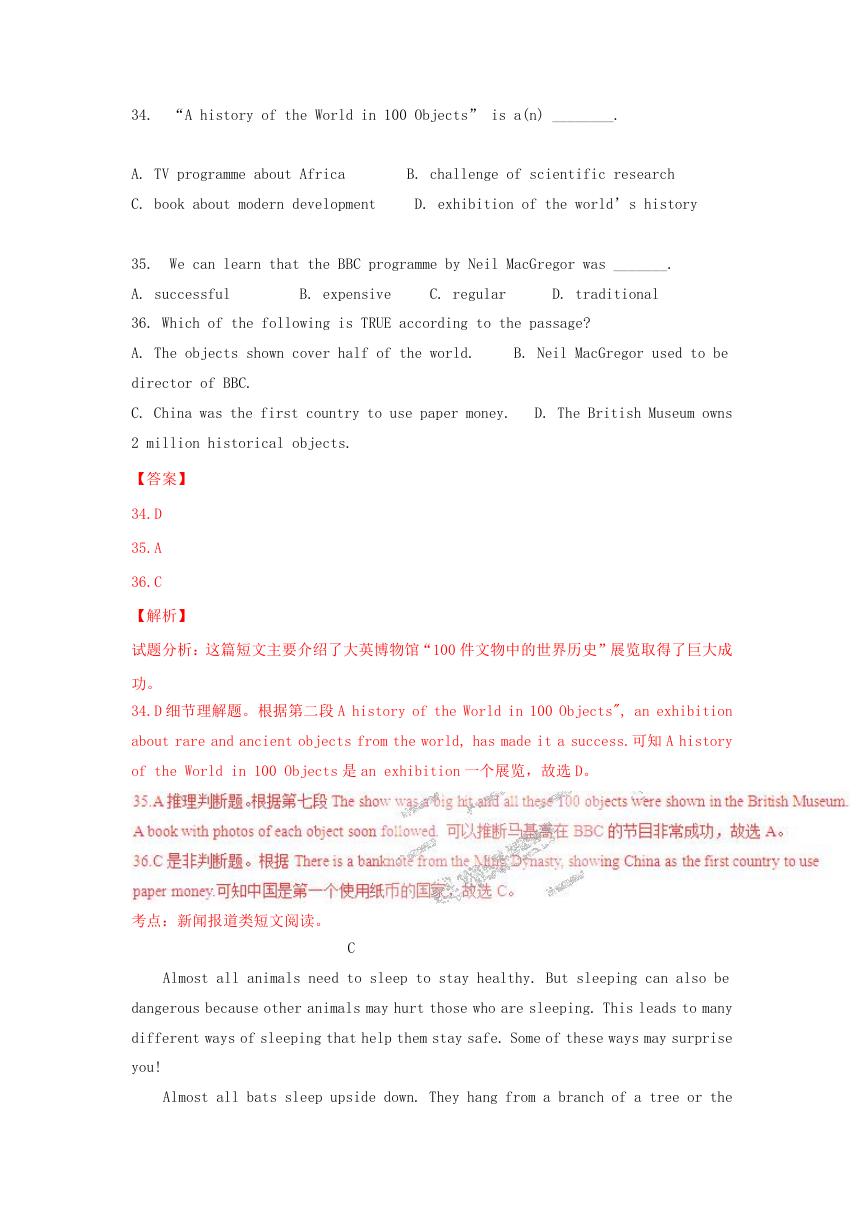








 2023年江西萍乡中考道德与法治真题及答案.doc
2023年江西萍乡中考道德与法治真题及答案.doc 2012年重庆南川中考生物真题及答案.doc
2012年重庆南川中考生物真题及答案.doc 2013年江西师范大学地理学综合及文艺理论基础考研真题.doc
2013年江西师范大学地理学综合及文艺理论基础考研真题.doc 2020年四川甘孜小升初语文真题及答案I卷.doc
2020年四川甘孜小升初语文真题及答案I卷.doc 2020年注册岩土工程师专业基础考试真题及答案.doc
2020年注册岩土工程师专业基础考试真题及答案.doc 2023-2024学年福建省厦门市九年级上学期数学月考试题及答案.doc
2023-2024学年福建省厦门市九年级上学期数学月考试题及答案.doc 2021-2022学年辽宁省沈阳市大东区九年级上学期语文期末试题及答案.doc
2021-2022学年辽宁省沈阳市大东区九年级上学期语文期末试题及答案.doc 2022-2023学年北京东城区初三第一学期物理期末试卷及答案.doc
2022-2023学年北京东城区初三第一学期物理期末试卷及答案.doc 2018上半年江西教师资格初中地理学科知识与教学能力真题及答案.doc
2018上半年江西教师资格初中地理学科知识与教学能力真题及答案.doc 2012年河北国家公务员申论考试真题及答案-省级.doc
2012年河北国家公务员申论考试真题及答案-省级.doc 2020-2021学年江苏省扬州市江都区邵樊片九年级上学期数学第一次质量检测试题及答案.doc
2020-2021学年江苏省扬州市江都区邵樊片九年级上学期数学第一次质量检测试题及答案.doc 2022下半年黑龙江教师资格证中学综合素质真题及答案.doc
2022下半年黑龙江教师资格证中学综合素质真题及答案.doc